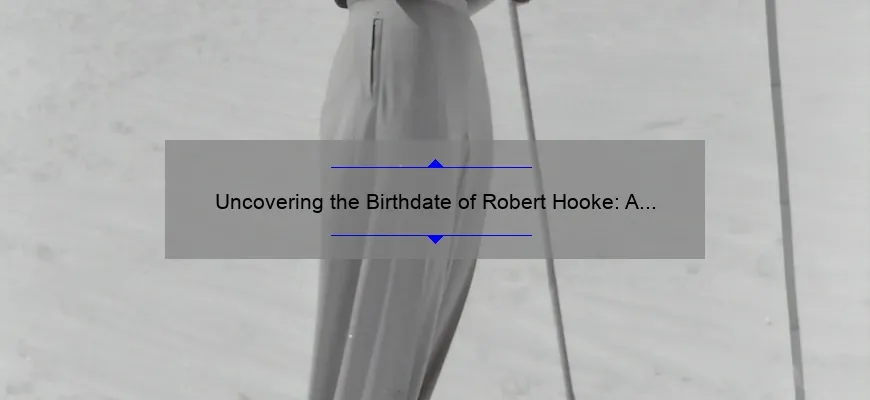Short answer when was Robert Hooke born:
Robert Hooke was born on July 28, 1635 in England.
FAQ about Robert Hooke’s Birth: What We Know and What We Don’t
Robert Hooke is one of the most renowned and influential scientists in history. He was a renowned physicist, mathematician, chemist, inventor, anatomist, architect and even an artist. His remarkable contributions to science continue to influence generations of scholars till this day.
But when it comes to Robert Hooke’s birth, there are still several questions that historians and biographers have yet to answer. In this article, we explore some frequently asked questions about Robert Hooke’s birth – what we know and what we don’t.
Q1: When Was Robert Hooke Born?
We know for sure that Robert Hooke was born on July 18th, 1635. This date was recorded in the parish register of his hometown Freshwater on the Isle of Wight.
Q2: Who Were His Parents?
Robert Hooke’s father was John Hooke who had moved from Devonshire to work as a clergyman on the Isle of Wight. His mother’s name has not been precisely identified due to lack of information but according to various sources she might have been Cecily Gyles or Sarah Baker
Q3: Did He Have Any Siblings?
Yes! Robert grew up with three older brothers named John (b.1628), Nathaniel (b.circa 1629) and Francis (b c1630). Nathaniel also became scientist like his brother but he is lesser known compared to him.
Q4: Where Was He Born?
This question has led us down a rabbit hole over many years- While earlier records listed his birthplace as Newport instead it seems as though research indicates otherwise now.It appears that recently discovered documents suggest he may have actually been born in East London rather than Newport or Freshwater which were all previously thought possible sites only until new evidence surfaced
So while it remains multiple interpretations based on limited data available strictly speaking although Freshwater remains officially registered site it cant be conclusively claimed as the birthplace till more concrete evidence comes up
Q5: What Was Robert Hooke’s Childhood Like?
We don’t have a lot of information about Robert Hooke’s childhood. We do know that he was educated at home by his father before attending Westminster School in London. Despite suffering from poor health, he showed an early interest in science and exhibited natural talent.
Q6: When Did He Start Making Contributions To Science?
Hooke made significant contributions to science throughout his life, starting with his work as curator of experiments at the Royal Society from 1662 until his death in 1703. Some of his notable discoveries include Hooke’s Law (spring constant concept), celestial observations telescope design improvements, microscopic imagery optics- all landmarking advancements for scientific progression during the later half of XVII century
In conclusion, while we have some answers regarding Robert Hookes’ birth details such as date and likely family background albeit a few questions raised but nuances related to location only goes on to reiterate importance of diligent research process since new or updated information could always change our understanding on anything which is hailed universally accepted facts earlier!
When Was Robert Hooke Born? Uncovering the Truth with In-Depth Analysis
The world of science and invention is full of fascinating people whose contributions have changed our lives in profound ways. One such individual is Robert Hooke, a polymath who made incredible advances in various fields during the 17th century.
But before we delve into his impact on scientific history, let’s first uncover an essential fact: when was Robert Hooke born?
According to records from St. Helen’s Bishopsgate church in London, England – where he was baptized – Robert Hooke was born on July 18, 1635. However, some discrepancies exist among historians regarding his actual birthdate.
One explanation for this discrepancy lies in the Outbreak of Plague that ravaged Europe In The Mid-seventeenth Century; apparently wiping out entire communities leaving behind no trace of inhabitants whatsoever. Therefore one could argue that perhaps not all record-keeping would be as detailed or accurate as it should have been.
Regardless of possible inconsistencies between historical documents and researchers’ opinions, there are still valid sources providing evidence indicating that Hooke must have inserted false data Into archives into avoid the harsh treatment towards those known to be inflicted with the plague throughout history.
What makes this question complex stems from two main factors: firstly, records from births were less precise than they are today; secondly – it highlights how culturally significant each day’s events were which influenced these logbooks noting down those details about individuals considered noteworthy for posterity (i.e., baptisms).
But why is knowing when someone like Robert Hooke was born so crucial?
Firstly because recordings help confirm historically distinguished personas their birthdates helps establish important facts lines concerning timelines achievements developments et al Through Herefore aiding Explorers looking to dig deeper through Various cultures histories As a means to understand society better within its contextual parameters
Secondly understanding specific dates in conjunction with other prominent figures enables academics further analyzing time periods matching similar trends occurrences innovations while making sense Of New discoveries Hence possessing enhanced knowledge through a holistic approach to learning.
Robert Hooke’s work as an experimental scientist, polymath, architect, and inventor revolutionized the scientific community. His contributions range from his invention of the compound microscope – with which he observed various living organisms and structures such as red blood cells for the first time – to his acclaim in assisting Christopher Wren in designing many famous English sites over hundreds of years that we still continuously reminisce about today
Besides telling us more about one person’s story, understanding when Robert Hooke was born also gives us insight into society at large over centuries past. It confirms what technological advancements existed during specific moments in history; highlighting any religious or political placements present at that time et al
By comprehending these intricate details attributed to People And Cultures Provides A Broader Perspective To Interpret historical context; even though dates may seem irrelevant minor Misrepresented Without Accurate Recordings During this previously mention period can leave confusion when it comes Analyzing Their Legacy regarding potential significance amongst different schools Of Thought Details Such Birthdays Are Important In Understanding Events That Led Up To The Modern World As We Know it Today!
The Top 5 Fascinating Facts About Robert Hooke’s Birthday You Need to Know
Robert Hooke, the pioneering English scientist, was born on July 28th in the year of 1635. This day marks a significant date in history since he paved the way for modern scientific research and revolutionized various fields such as optics, physics, biology and architecture.
Here are the top five fascinating facts about Robert Hooke’s birthday that you need to know:
1. Hooke Had A Significant Impact On Scientific Research
Hooke may not be a household name like Galileo or Newton but his contributions to science cannot go unnoticed. He revived experimental philosophy by proving that observation through physical experiments can explain natural phenomena rather than relying solely on theoretical constructs.
2. His Birthday Coincides With The Discovery Of Mars
July 28th happens to be a lucky day for astronomical discoveries because it is also when Giovanni Schiaparelli discovered Mars’ channels known as ‘canali’ in Italian back in 1877. These observations sparked speculations regarding possible alien life forms which fueled public imagination leading up to space exploration efforts years later.
3. Hooke Was An Accomplished Architect
Apart from being an accomplished biologist and physicist, Robert Hooke was one of England’s finest architects who worked alongside notable figures such as Christopher Wren during his lifetime. Some of his most recognizable works include London’s Monument to the Great Fire of 1666 and St Pauls Cathedral.
4. His Work Has Revolutionized Microscopy As We Know It Today
The invention of microscopes significantly enhanced our understanding of biological structures previously hidden from naked eye vision. Hooke played an integral role in this field with his remarkable work ‘Micrographia’. The book showcases illustrations depicting microscopic organisms magnified beyond what was thought possible at that time guiding subsequent generations of scientists towards groundbreaking discoveries.
5. NASA Also Celebrates His Contribution To Science
At present times, even NASA recognizes Robert Hookes contribution towards advancing human knowledge by curating his work on the forefront astronomical research. NASA has named its twin orbiters after him and Christiaan Huygens, their mission was to study Saturn’s largest moon, Titan.
In conclusion, Robert Hookes’ birthday holds great significance not only for scientific endeavors but also for architectural marvels worldwide and possibly alien life forms exploration efforts. We must acknowledge this remarkable scientist who reshaped our understanding of nature through experimentation and observation as we celebrate his birthday every year.

